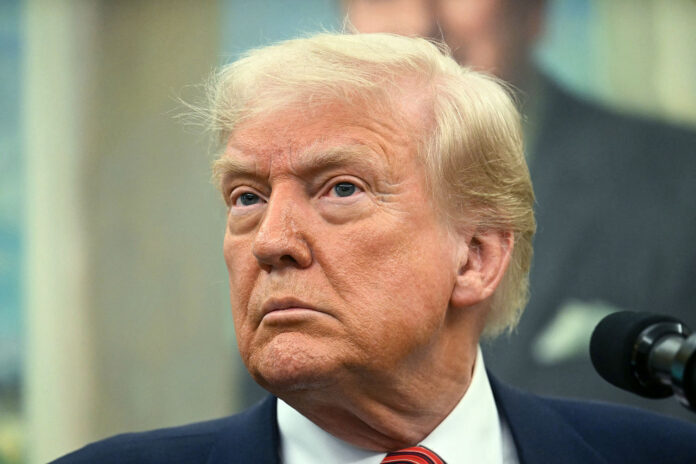The start of the deal: Why Trump stopped emphasizing speed on trade deals
By Jonathan Allen
Just a few weeks ago, President Donald Trump and White House aides were boasting that his tariffs would force a legion of foreign nations to rush into new trade deals — and that Trump’s prowess would yield more favorable terms for the United States.
“I’m telling you, these countries are calling us up, kissing my a–,” Trump said last month before his reciprocal tariffs were due to go into effect. “They are dying to make a deal. ‘Please, please, sir, make a deal. I’ll do anything. I’ll do anything, sir!’”
After Trump paused some of his tariffs and declared a three-month negotiating window, his trade adviser, Peter Navarro, said a few days later on NBC News’ “Meet the Press,” “We’ve got 90 deals in 90 days possibly pending here.”
But Trump has changed his tone and his tune in recent days, as it has become clear that trade agreements don’t materialize as quickly as he would like and that there aren’t dozens in the queue. His shift also comes amid heavy criticism that his tariffs will hike prices for consumers and harm an American economy that had its first negative growth in years in the first quarter.
“You keep writing about deals, deals. When are we going to sign one? It’s very simple. We’re going to say, in some cases, we want you to open up your country. In some cases we want you to drop your tariffs,” an obviously frustrated Trump told reporters Tuesday.
“So I wish they’d keep, you know, stop asking, ‘How many deals are you signing this week?’ Because one day we’ll come and we’ll give you 100 deals. And they don’t have to sign.”
Beyond the ambitious sweep of trying to haggle with scores of nations at once, the United States has yet to open discussions with its largest trading partner — China — since Trump applied a 145% across-the-board tariff on its products.
Treasury Secretary Scott Bessent told lawmakers Wednesday that his planned meeting with Chinese officials in Switzerland this weekend amounts to an early phase of negotiations that is not as far along as talks with less crucial nations.
Read more →
Holding steady: The Federal Reserve said it was leaving interest rates unchanged as it warned that the chances of both higher unemployment and higher inflation had climbed in the wake of Trump’s tariff plan.
The first signs of a Trump-Netanyahu divide?
By Andrea Mitchell
When President Donald Trump announced Tuesday that the Yemeni Houthis had agreed to stop firing on U.S ships in the Red Sea and that the United States had halted its airstrikes against the Iran-backed militia, America’s closest ally in the Middle East was caught unaware.
Israel didn’t even know a ceasefire was in the works, and its vessels aren’t covered by the truce. In fact, the same day, Israel had hammered the airport in Yemen’s capital, retaliating for a Houthi strike almost hit Israel’s Ben Gurion Airport. The Houthis haven’t said whether they are also extending safe passage to other international shipping so they could resume sailing through the Red Sea and the Suez Canal, a much cheaper route than the lengthier voyage around the Horn of Africa.
The first public hint of a possible breach between U.S. and Israeli leadership came when Israeli Prime Minister Benjamin Netanyahu visited the White House last month, hoping the United Stateswould provide air support for a possible Israeli operation against Iran’s nuclear facilities. Instead, Trump announced he would agree to direct talks with Iran.
And now, the administration is pressuring Israel and Hamas to agree to a ceasefire and hostage release within days. That’s because Trump wants to announce an agreement before he leaves next week for Saudi Arabia, the United Arab Emirates and Qatar for the first foreign trip of his second term. His impatience is rooted in his hope of making progress toward completing the Abraham Accords, which he initiated in his first term, by getting Saudi Arabia to take the first steps toward recognizing Israel. The effort continued under President Joe Biden, but it collapsed when Hamas attacked Israel on Oct. 7, 2023, triggering the war in Gaza. And the Saudis won’t consider it while the war continues.
But Hamas is entrenched, Israel has reoccupied two-thirds of Gaza, and Netanyahu’s Cabinet has called up the reserves to expand the fighting. This week, special Middle East envoy Steve Witkoff keynoted Israel’s Independence Day celebration in Washington, D.C., by gently chiding Israelis to overcome their political divisions. On Wednesday, Netanyahu’s closest political adviser, Ron Dermer, the former ambassador to the United States, arrived in Washington for ceasefire talks with Secretary of State/national security adviser Marco Rubio and Witkoff.
The question is: Will Netanyahu reverse course in Gaza to achieve an even more important shared goal with the United States — an economic and security agreement with Saudi Arabia, completing his dream of peace and prosperity with the Arab world?


